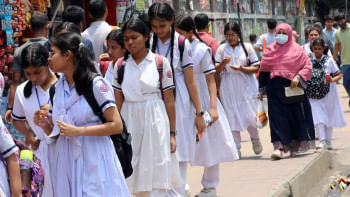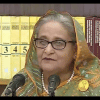Will we finally take student suicides seriously?

Comb through the news after SSC results are published, and you may find amid the pictures of celebrations the reports of students who have died by suicide for not achieving their desired results. This tragic phenomenon, though shocking each time, is unfortunately not new.
Last year saw the much discussed report by the Aachol Foundation, which stated that 513 students had died by suicide in 2023. Out of them, 227 students were school students, meaning that this extremely young demographic accounted for approximately 44 percent of all student suicides.
This warrants our attention, not just in the predictable times for these suicides to occur, such as with SSC results, but in general considering how shockingly high the number is. In addition, there is still a heavy stigma attached to suicides, making discussions a difficult matter. Bangladesh's own unique kaleidoscope of problematic beliefs regarding suicide involves superstition, religion, education, class positions, lack of support, fear of shunning, and stereotypes about mental illness. Moreover, mental health services and hospitals to assist people who are struggling or have made an attempt are dismal. All these not only prevent one from reaching out for help, but also delays their recognition of their own suffering.
What we seem to be failing to understand repeatedly is just how vulnerable young people are. In a culture that is so hierarchical, speaking up poses more challenges than it may in other countries of the world. Respect towards parents is heavily emphasised. While this typically includes paying heed to the parent's words and wishes, it may also mean that making parents uncomfortable with what they may be unfamiliar with evokes sharp reactions. For older generations, this realm of unfamiliarity often involves struggles with mental health, sometimes in association with exams.
Overreactions from parents are a running theme in South Asian social media, one which often portrays the parents as becoming extremely angry at criticism and reacting in such a manner as to make their children silent. While these are played for comedic effect and the situation is not always serious, high expectations along with anger at not performing as expected makes students disinclined from talking freely with parents and other adults. One particularly stressful account mentioned by a student choosing to go anonymous goes like this: following her failure to obtain enough A+ in her JSC exams, her parents refused to speak to her for three months. All this was worsened with the onset of the Covid pandemic, which made matters more difficult. She shared that the pressure became so immense that she might have done "something harsh" had she missed GPA 5 in her SSC results, following which it seemed that her mother embraced her after ages. Now, with the HSC exams, she is experiencing a similar kind of pressure once again.
Such accounts can often be heard of parents withdrawing from their children, giving the silent treatment for extended periods of time, and dismissing the students' mental health concerns, such as an unhealthy amount of stress or fixation when it comes to exams.
Furthermore, as a recent article discussed, corporal punishment continues to be a severe issue in Bangladesh. A study jointly conducted by the Bangladesh Bureau of Statistics (BBS) and Unicef titled Multiple Indicator Cluster Survey 2019 found that for children aged from 1 to 14 years, 89 percent suffered corporal punishment. The extremely detrimental effects of such punishments seem to be unknown to many parents even today. Considering this, we can see why for SSC candidates, the stress of board exams may be an especially sensitive time as it may reopen wounds from negative experiences of the past.
Exacerbating the situation is our culture's repeated failure to understand how perceptive young people can be. Young students are frequently aware of the sacrifices made by their parents. The effects of inflation, increasing competition in public universities, and eventually the difficulties of getting a stable, decently paying job are not lost on them. They also know that should they not gain admission to public universities, private university tuition can be exorbitant, and the thought of burdening their parents weighs heavily on them. At the age of 15-17, this stage of life may seem monumental.
Unintentionally, we often engage in behaviour that adds pressure. For instance, there is a deep-rooted societal insensitivity to the way we talk about students and their grades. Whether it be grade inflation or auto pass, the manner in which we speak about these often has a tone which implies that students who are taking exams have it easy. This may have a compounding effect on the stress experienced by students who do not perform well. Moreover, the many reasons for why a student may have poor performances is often not explored, further humiliating the students who may in fact just require tailored attention and time.
Looking at the Aachol Foundation study, it may seem as if more intricate trends exist between certain conditions and student suicides. However, the lack of follow-ups along with the scant amount of details in existing reports on them makes it a complicated task to draw conclusions. It is abysmal that to this day, despite so many repeated incidents of student suicides, we remain lacking in many sectors, and a national suicide prevention strategy is still not in place.
We need to recognise that the time of public exam results is an especially sensitive time. The case of Sarbajit Ghosh Ridoy, who took his own life after hearing his results that later turned out to be incorrect, should be seen as a stark reminder of how needless student suicides are.
To the young who may be experiencing a difficult situation for the first time in their lives, it may seem insurmountable, and the lack of experience can prevent them from seeing the possibilities that may come their way in the future. In a state of desperation, death may seem like the sole path left. Students, especially ones who are this young, may lack the capacity to understand that obstacles no matter how massive they seem, can be overcome. That almost half of the students who died by suicide last year were school students should alarm us, and it might be time for us to recognise that this may in fact be a public health emergency.
Aliza Rahman is a member of the editorial team at The Daily Star. She can be reached at [email protected].
Views expressed in this article are the author's own.
Follow The Daily Star Opinion on Facebook for the latest opinions, commentaries and analyses by experts and professionals. To contribute your article or letter to The Daily Star Opinion, see our guidelines for submission.

 For all latest news, follow The Daily Star's Google News channel.
For all latest news, follow The Daily Star's Google News channel. 









Comments